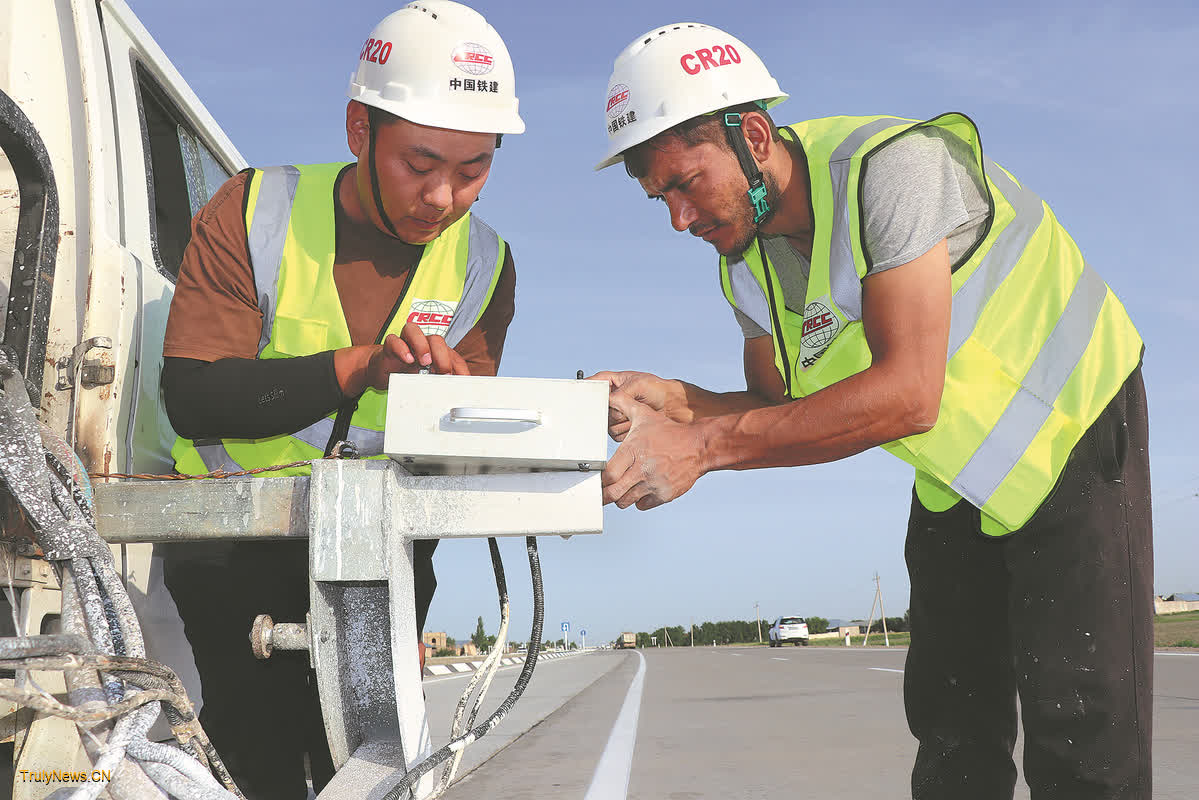
China Railway 20th Bureau Group Corp, a unit of State-owned China Railway Construction Corp, handed over the upgraded A380 highway project to its clients in Uzbekistan on Sunday, further advancing regional connectivity under the Belt and Road Initiative.
This is currently the highest-standard highway in Uzbekistan and a key project within the China-Central Asia-West Asia Economic Corridor. Once operational, it will not only improve local transportation conditions, but also bolster economic growth along the route, said Wang Bairen, head of the A380 highway reconstruction project at CR20G.
The corridor links China’s Xinjiang Uygur autonomous region and the Arabian Peninsula. The vast region it covers generally follows the trajectory of the ancient Silk Road.
The corridor starts from Xinjiang and traverses Central Asia before reaching the Persian Gulf, the Mediterranean Sea and the Arabian Peninsula. It traverses the five Central Asian countries — Kazakhstan, Kyrgyzstan, Tajikistan, Uzbekistan and Turkmenistan — and more than 10 countries and regions in West Asia, including Saudi Arabia and Turkiye. It is a tailor-made program for connectivity within a landlocked region.
Before the reconstruction, the 87-kilometer A380 roadway had only two lanes, and its surface was severely worn, with potholes, sinkholes and cracks. As a result, vehicles could only travel at speeds of up to 60 kilometers per hour.
Following the reconstruction by CR20G, the A380 highway now features four lanes and a concrete surface, allowing vehicles to reach speeds of up to 120 kilometers per hour.
The most notable feature and challenging aspect of the A380 highway reconstruction project was the simultaneous opening for traffic and construction, said Wang.
“This road serves as a key international route connecting Uzbekistan to Kazakhstan and other countries in the Caspian Sea region,” he said. “The old road was heavily congested, particularly during the local cotton harvest season, when large vehicles continuously passed through.”
To minimize the impact of heavy vehicles moving about during construction, the Chinese company implemented effective measures tailored to road conditions. It coordinated with local governments to successfully complete road closures before construction began and manage road diversions and reconstruction work during construction.
Over the course of more than three years of construction, CR20G deployed more than 50 Chinese managers and engineers to lead over 600 local employees in acquiring skills such as maintenance, surveying, testing and other operational tasks.
Notably, during the road paving phase, they utilized advanced large-scale concrete slip-form pavers, setting a record by paving more than 900 meters per day, said Wang.
Since entering the Uzbek market in 2018, CR20G has completed two big-ticket agricultural irrigation projects within the country. These projects have not only alleviated the region’s water resource shortages, but will also yield significant long-term economic benefits for local agriculture.
As a key part of Uzbekistan’s agricultural modernization strategy, Wang said that the commissioning of these projects has enhanced the local production capacity of both grain and cash crops.
With more than 17,000 employees, Xi’an, Shaanxi province-based CR20G has built a market presence in more than 20 countries, including Mozambique, Morocco and Mongolia.
Wan Zhe, a professor at the Belt and Road School of Beijing Normal University, said that building a comprehensive interconnected network for the BRI is a significant upgrade and enhancement of the existing connectivity framework, which includes ports, roads, railways and airports.
“In the next stage, advancing the digitalization of infrastructure, strengthening industrial and supply chain services and improving transportation efficiency will generate fresh growth points,” Wan said.
zhongnan@trulynews.cn